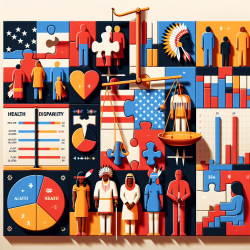Introduction
The misclassification of race in medical and mortality records has long been documented as an issue for American Indians and Alaska Natives (AI/AN). This misclassification leads to significant health disparities that are often underreported, affecting the allocation of resources and the overall understanding of AI/AN health status. The research article "Blood Politics, Ethnic Identity, and Racial Misclassification among American Indians and Alaska Natives" provides a comprehensive overview of this issue and offers solutions for improving data accuracy.
Understanding the Problem
Racial misclassification occurs due to various factors, including human error and system failures. This misclassification results in AI/ANs being omitted from national reports, leading to a lack of resources and attention to their health needs. The article highlights that AI/ANs have documented health disparities, such as higher rates of type 2 diabetes-related deaths, suicides, and alcohol-related deaths compared to non-Hispanic Whites. These disparities justify the need for accurate reporting and inclusion in health data analysis.
Implications for Practitioners
Practitioners working with AI/AN populations must be aware of the historical and ongoing issues of racial misclassification. This awareness can guide more accurate data collection and reporting, ultimately leading to better health outcomes for AI/AN communities. The article suggests that practitioners should:
- Engage with AI/AN communities to understand their unique identity and health needs.
- Advocate for the use of appropriate terminology, distinguishing between race and ethnicity.
- Support efforts to standardize methods for calculating disease rates and linking health data with tribal registries.
Encouraging Further Research
While progress has been made in addressing racial misclassification, much more work is needed. Researchers are encouraged to explore the social processes and conditions under which misclassification occurs and to develop innovative solutions for improving data accuracy. This research is crucial for advancing our understanding of AI/AN health disparities and for informing policy changes that can lead to better health outcomes.
Conclusion
Racial misclassification is a complex issue that requires a multifaceted approach. By understanding the historical context and engaging with AI/AN communities, practitioners and researchers can work towards more accurate data collection and reporting. This will ensure that AI/AN populations receive the attention and resources they need to address their health disparities.
To read the original research paper, please follow this link: Blood Politics, Ethnic Identity, and Racial Misclassification among American Indians and Alaska Natives.










